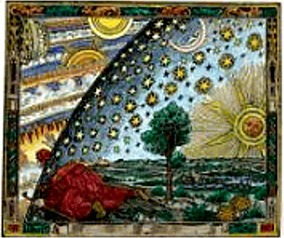The Alchemist Monk Francois Rabelais
 Cannabis: The Philosopher’s Stone
Cannabis: The Philosopher’s Stone
Part 3: The Alchemist Monk Francois Rabalais
from Green Gold: the Tree of Life, Marijuana in Magic and Religion
by Chris Bennett, Lynn Osburn, and Judy Osburn
(published by Access Unlimited: [email protected])
CONTENTS
- The Knights Templar and Cannabis
- Sufi Alchemists and the Grail Myth
- The Alchemist Monk Francois Rabalais
- Medieval Alchemists and Cannabis
- The Hashish Club
- The Alchemist Monk Francois Rabelais
One brave philosopher who dared to challenge the ban on hemp in medieval Europe was the Benedictine monk and qualified Bachelor of Medicine, Francois Rabelais (1494-1553). Rabelais was familiar with the alchemical writings of the Sufi s, via Avicienna, as well as the medieval Templars , referring to the good knights of the Templar a number of times in his works, indicating he was most likely sympathetic with their cause.
Like the Templars , Rabelais suffered the harsh persecution from both the Roman Catholic Church and the civil authorities. The Papacy and political rulers were angered over the contents of his famous books Gargantua and Pantagruel , which made a mockery of both church and state and also contained many hidden references to things occult. We are here more concerned with the books of good Pantagruel , which is based around a parody of the Grail myth. The books of Pantagruel also contain references to hemp which were written esoterically.
The Life of Gargantua and Pantagruel by Francois Rabelais is an esoteric work, a novel in cant. The good cure of Meudon reveals himself in it as a great initiate , as well as a first class cabalist. — Fulcanelli, Master Alchemist, Le Mystere des Cathederales
The 20th century alchemist, Fulcanelli also referred to this language of cant, as the Language of the Birds, echoing the Sufi author Attar’s Conference of Birds (see chapter 14, Moslem World), a mystic ode to hashish . Author Kenneth Rayner Johnson comments on this language of cant in The Fulcanelli Phenomena:
All initiate s, Fulcanelli states, spoke in cant — including the masons who built the cathedrals and who were the operative predecessors of today’s speculative Freemasons. Eventually he maintains, the “language verte” or “green language” (green…being the color of initiation in the secret societies referred to earlier) became the mode of speech of the poor, humble and oppressed. An indication of this fact can be discerned in the use of “rythming slang” among London’s Cockneys, or in the jargon of “hip” or “jive-talk” originally derived from American Negro blues artists and other musicians.
Fulcanelli says:
“It remains the language of a minority of individuals, living outside accepted laws, conventions, customs and etiquette. The term voyous (street-arabs), that is to say voyants (seers), is applied to them and the even more expressive term, sons or children of the sun….” — Quoted by Kenneth Rayner Johnson, The Fulcanelli Phenomenon
Of particular interest to us must be the most oblique segments of Pantagruel , Book III, chapters 49-52 [the chapters concerning hemp ]. For long periods these chapters were banned by the church, and in many modern translations of Pantagruel they are omitted. — Ben Price, “Where the Pantagruelion Grows”[18]
Some years before he wrote his book, Rabelais was temporarily imprisoned in his monastery, when he and another brother started studying Greek works. At that time the Greek language was considered heretical because conflicting New Testament material written by patriarchs of the Byzantine Christian Church was written in Greek and opened up the possibility of criticism of the Roman Catholic Church. Also, Pagan and Gnostic texts were written in Greek. It is not clear what the nature of the information in the original Greek text was, but from what history has recorded, the church leaders must have felt threatened by it. Rabelais managed to obtain an indult (special exemption) from Pope Clement VII and went on to write his famous Works. Unfortunately little is known of Rabelais after his books were published. He virtually disappeared in the midst of outrage from church and state over their publication.
In the introduction Rabelais gives readers the following hint of the hidden information contained in his book:
Following the dog’s example, you will have to be wise in sniffing, smelling and estimating these fine and meaty books; swiftness in the chase and boldness in the attack are what is called for; after which, by careful reading and frequent meditation, you should break the bone and suck the substantific marrow in the course of it you will find things of quite a different taste and a doctrine more abstruse which shall reveal to you most high “sacraments” and horrific mysteries in what concerns our religion, as well as the state of our political and economic life. — Rabelais , Pantagruel
As a free thinker not willing to risk his cherished well-being in a society hostile to what went on in his head, Rabelais chose to keep his thoughts private, but not unshared. He shared them with rare individuals who, like himself, were undaunted by their own irreverence, and who were capable thereby of circumventing the rigid convention of literary and grammatical tradition. Through an early form of surrealism, he conveyed his message to those who were not too rigid in their perceptions to understand it. — Ben Price, “Where the Pantagruel ion Grows”
In Pantagruel , Rabelais gives a distinct description of hemp , which he calls “The Herb Pantagruelion:”[19]
The leaves sprout out all round the stalk at equal distances, to the number of five or seven at each level; and it is by special favor of Nature that they are grouped in these two odd numbers, which are both divine and mysterious. The scent is strong, and unpleasant to delicate nostrils.
Rabelais goes on to describe the familiar applications of hemp pulp and fiber:
Without this herb, kitchens would be detested, the tables of dining rooms abhorred, although there were great plenty and variety of most dainty and sumptuous dishes of meat set down upon them; and the choicest beds also, how richly so ever adorned with gold, silver, amber, ivory, prophyry, and the mixture of most precious metals, would without it yield no delight or pleasure to the reposer in them. Without it millers could neither carry wheat, nor any other kind of corn, to the mill; nor would they be able to bring back from thence flour, or any other sort of meal whatsoever. Without it, how could the papers and writs of lawyers’ clients be brought to the bar? Seldom is the mortar, lime or plaster brought to the workhouse without it. Without it how should the water be got out of the draw well? In what case would tabellions, notaries, copists, makers of counterparts, writers, clerks, secretaries, scriviners, and such like persons be without it? Were it not for it, what would become of the toll-rates and rent-rolls? Would not the noble art of printing perish without it? Whereof could the chassis or paper windows be made? How should the bells be rung ? The altars of Isis are adorned therewith; the pastophorian priests are therewith clad and accourted; and whole human nature covered and wrapped therein, at its first position and production in, and into this world; all the lanific trees of Seres, the bumbast and cotton bushes in the territories near the Persian sea, and gulph of Bengala: the Arabian swans, together with the plants of Maltha, do not all of them cloath, attire and apparel so many persons as this herb alone. Soldiers are now-a-days much better sheltered under it, than they were in former times, when they lived in tents covered with skins. It overshadows the theatres and amphitheatres from the heat of the scorching sun; it begirdeth and encompasseth forests, chases, parks, copses and groves, for the pleasure of hunters; it descendeth into the salt and fresh of both sea and river waters, for the profit of fishers; by it are boots of all sizes, buskins, gamashes, brodkins, gambados, shoes, pumps, slippers, and every cobbled ware wrought and made steadable for the use of man; by it the butt and rover-bows are strung, the crossbows bended, and the slings made fixed; and, as if it were an herb every whit as holy as the verveine, and reverenced by ghosts, spirits, hobgoblins, fiends and phantoms, the bodies of deceased men are never buried without it.
Rabelais tells us the hero of his tale, Pantagruel , a giant named after the said herb, loaded for a voyage and, “amongst other things, it was observed how he caused to be fraught and loaded with an herb of his called Pantagruel ion, not only of the green and raw sort of it, but of the confected also.” The confection Rabelais refers to is the edible Turkish delight — a hashish confection.
Rabelais was so enamored with hemp that in his estimation it stood at the very pinnacle of plant life: “in this pantagruel ion have I found so much efficacy and energy, so much completeness and excellency, so much exquisiteness and rarity, and so many admirable effects and operations of a transcendent nature….”
It is interesting that Rabelais speaks of hemp ’s transcendent nature. Rabelais was more than familiar with the alchemical literature that circulated so covertly at that time, and he incorporated the secret language of this hidden art into his writings. Alchemical and occult literature often refer to connecting an individual’s feminine and masculine aspects together in a unified force, as marrying your Goddess, or the marriage of the sun (masculine, left-brain, analytical, rational) and the moon (feminine, right-brain, analogical, creative). This theme appears again and again in medieval occult literature, and most likely has its roots in a much earlier tradition. Francois Rabelais hinted at a connection between hemp and this spiritual marriage. He ends one of the chapters devoted to the herb Pantagruel ion stating that by means of this herb mankind might discover an even more powerful herb and ascend to the heavens:
Who knows but by his sons may be found out an herb of such another virtue and prodigious energy, as that by the aid thereof, in using it aright, according to their father’s skill, they may contrive a way for human kind to pierce into the high aërian clouds, get up into the spring head of the hail, take an inspection of the snowy sources…; then it is like they will set forward to invade the territories of the moon, whence passing thro’ both Mercury and Venus, the Sun will serve them for a torch, to show the way to Jupiter and Saturn. We shall not then be able to resist the impetuosity of their intrusion, nor put a stoppage to their entering whatever regions, domiciles, or mansions of the spangled firmament they shall have mind to see…all the celestial signs together with the constellations of the fixed stars, will jointly be at their devotion then…
Here Rabelais has repeated the planetary ascent in Mithraic initiation as well as an ascent through the Cabalistic Sephira, and different levels of consciousness. As can be see in Crowley’s Quabalistic Encyclopedia “777,” and elsewhere. Rabelais has the gods lament that should mankind succeed in this climb then they will surely: “drink of our nectar and ambrosia, and take to their own beds at night, for wives and concubines, our fairest goddesses, the only means whereby they can be deified.”
Perhaps the identity of the herb which could be utilized by Pantagruel’s descendants is alluded to in the chapter following Rabelais’ last comments, “How a certain kind of Pantagruelion is of that Nature, that Fire is not able to consume it.”
Chapter 52 of Book III relates the amazing fable concerning “how a certain kind of Pantagruel ion is of that nature that the fire is not able to consume it.” First, it is noteworthy that Rabelais suggests different varieties of the plant. Second, the statement that the plant will not burn is extraordinary enough to tempt experimentation with the plant in the presence of fire. Readers smitten by curiosity on this point were equally likely to be smitten, finally and pleasantly, by the singular virtues of the plant Rabelais called “Pantagruel ion.” A happy discovery that would also, upon re-reading the author’s words, unlock their secret references and make their meaning plain. — Ben Price, “Where the Pantagruel ion Grows”
In light of Price’s comments concerning the Pantagruel ion that is not consumed by fire, it is interesting to note that Rabelais was familiar with the writings of Zoroaster , and he translated into French the Greek works of Herodotus, who wrote about Scythians inhaling cannabis smoke to achieve ecstasy.
Rabelais , in his fifth and last book of the series reveals to us quite plainly: “the good Pantagruel ion which is hemp .” Rabelais states that he felt it was time to reveal more plainly his cryptic message, and get rid of the cipher that hid it: “Now, my friends, that you may put in for a share of this new wisdom , and shake off the antiquated folly this very moment, scratch me out of your scrolls, and quite discard the symbol of the old philosopher with the golden thigh, by which he has forbidden you to eat beans,[20] that is, Pantagruel ion books.” (Which of course contained replete references to the herb Pantagruelion, hemp )
Perhaps this was some of Rabelais cryptic humor. Remember Pythagoras was the philosopher with the golden thigh that taught his students not to eat beans. Pythagoras was the first sage to call himself a philosopher. His golden thigh referred to shaman ic initiation. He was initiate into all the secret mysteries of the ancient world and had close friendship ties with the Hyperborean shaman priest of Apollo, Abaris the Scythian. Scythian shamans fumigated [purified ] and incense d themselves to ecstasy and revelation with cannabis smoke.
Rabelais tells the reader that he had not revealed the secrets concerning cannabis earlier because he wanted to have the opportunity to enjoy it himself for a while, “for you may take it for a truth, granted among all professors in the science of good eating, that he enjoined you not to taste of them for the dunsical-dog leach was so selfish as to reserve them for his own dainty chops.”
Rabelais was quite an old man at the time his books were published, and he knew it was time to reveal his secret to mankind more plainly, lest it be lost forever. He tells us that his great works (books) are finished. “Now though we have in our mother-tongue, several excellent works in verse and prose. I have made bold to choose to chirrup and warble my plain ditty, or as they say, to whistle like a goose among the swans, rather than be thought deaf among so many pretty poets and eloquent orators. And thus I am prouder of acting like a clown, or any other under part, among the many ingenious actors in this noble play, than of herding among the mutes, who, like so many shadows and cyphers, only serve to fill up the house and make up a number.”
Rabelais knew he would suffer the wrath of the Roman Catholic Church for debunking its heresies. “To the heathen philosopher succeeded a pack of capusions monks, who forbid us the use of beans that none but their nasty selves might have the stomach to eat it, though their liquorice chops watered never so much after it.”
He also had an idea of what his fate might be for exposing these forbidden secrets, as he states in the following comment, “Oh! they’ll cost me an estate in hemp en collars. For I hereby promise to furnish them with twice enough as much as will do their business, on free cost, as often as they will take the pains to dance at ropes end, providently to save charges, to the small disappointment to the finisher of the law.” (He had given them enough rope to hang him.) And so Francois Rabelais disappeared from history.
Any clergy, whether secular or myth bound, will feel threatened by a perceptual tool which allows the common man to transcend conditioning and experience unmediated clarity. This is what Rabelais knew would happen to the Medieval priests if he openly discussed the remarkable qualities of the plant, Pantagruel . It is the same fear-ridden reaction we see gripping Reaganite conservatives and the beneficiaries of other perceptual pogroms when it comes to any frame of mind that they have not included in the “official” scenario of reality. Any transcendental short-cuts or non-prescription vehicles toward “feeling better” undermine the reality-mediating role of the authorities. — Ben Price, “Where the Pantagruel ion Grows”
Francois Rabelais , we salute you our Brother, and dedicate the section on Alchemy to your great and bold spirit. He had “more strength in his teeth and scent in his bum” (to borrow a saying he used), than any man in Europe at that time.
Arabians, Indians, Sabeans,
Sing not, in hymns and paens,
Your incense, myrrh, or ebony:
Come here a nobler plant to see;
And carry home at any rate,
Some seed, that you may propagate.
If in your soil it takes, to heaven
A thousand thousand thanks be given
And say, with France, it goodly goes
Where the Pantagruel ion grows!
— Francois Rabelais
Some have suggested that the following quatrain written by Nostradamus referred to Rabelais :
The present together with the past
Judges by the great Jovialist
The world tires of him at last
Judged disloyal by the clergy
Nostradamus attributed his power of prophecy to a substance that could well have been cannabis: “Seated at night in my secret study, alone, reposing over the brass tripod.” He referred to the “secrets that are revealed by the subtle spirit of fire.” Nostradamus stated specifically in his will that his papers were to be left to whichever of his sons, upon reaching maturity, “..has drunk the smoke of the lamp.” Besides his prophetic writings, Nostradamus also wrote on herbal recipes, cosmetics, food and perfumes.
If people wanted to survive the Dark Ages and use cannabis they had better be discreet in referring to it. Both Rabelais and the medieval European farmers used the word “bean”[21] in conjunction with hemp . The Europeans used the term in a celebration, King and Queen of the bean, done in the hopes of having a tall hemp crop.
Consider if you will the tale of “Jack and the Beanstalk.” Jack is “the widow’s son.” This term is often used to refer to an initiate starting out on the path. For example, it is used in reference to Jesus, Parzival in the famous Grail Romances, and it was a cherished designation in Freemasonry. The cow that young Jack trades for the beans is his sacred cow that he must sacrifice if he wants to discover the truth of things. A parallel can easily be drawn between Jack’s reluctant trade of the family cow and the of the Magi saviour Mithra s, who slew the sacred bull unwillingly, and obtained the sacred vine of the mysteries. The beans are hemp seeds which will enable him to climb to the place of the Giants. The angry Giant is a manifestation of Jack’s personal demons that have been exposed and magnified by his climb up the beanstalk, or more precisely by his ingestion of hemp. Although this journey is fraught with danger, young Jack has the chance to hear the heavenly music of the Golden Harp, cast from the fine Gold of the true alchemists. And if the young hero is able to overcome the Giant, who represents his own lower nature, he will be able to return home and share the music of the Golden harp with his widowed mother and the rest of humanity.
A similar cryptic reference to the magnifying potentials of cannabis as that provided in Jack and the Beanstalk, can be found in The Conference of Birds, where Sufi author Attar uses the parrot as a hidden reference to hashish. Attar writes of the parrot’s arrival: “Welcome, O Parrot! In your beautiful robe and collar of fire, this collar is fitting for a dweller in the underworld but your robe is worthy of Heaven. Can Abraham save himself from the fire of Nimrod? Break the head of Nimrod and become the friend of Abraham, who was the friend of God. When you have been delivered from the hands of Nimrod put on your robe of glory and fear not the collar of fire.” [22]
This information hints at a secret tradition of cannabis use in medieval Europe, wisdom that had to be transmitted esoterically to avoid prohibitions and persecution from the Roman Catholic Church.
In 1615, an Italian physician and demonologist, Giovanni De Ninault, listed hemp as the main ingredient in the ointments and unguents used by the “Devils followers.”[23] — Ernest Abel, Marihuana; The First Twelve Thousand Years
FOOTNOTES
[18] Psychedelic Monographs and Essays Vol. 4, summer 1989, Thomas Lyttle, Ed. (Rabelais also mentions the Amanita muscaria mushroom, referring to “the good Fly Agaric” at least twice.)
[19] The term “pantagruelion” of course being used to avoid persecution from the church which had placed a ban on hemp.
[20] Author Ben Price commented that “through exaggeration” Rabelais, “made it clear that he was writing satire: It endangereth bad and unwholesome blood, and with its exorbitant heat woundeth them with grievous, hurtful, smart and noisome vapours.’ In other words, Rabelais was gaffing, smoking grass will give you gas and make you fart!” (Ben Price, “Where the Pantagruelion Grows,” Psychedelic Monographs and Essays, Vol. 4,1989). Hemp isn’t known for giving you gas, but beans most certainly do.
[21] Rabelais used the bean as a symbol for his dear herb “Pantagruelion.” In 16th century Europe we find “[y]et another quaint custom related to hemp growing involved the election of King and Queen of the Beans on the twelfth day (the Epiphany, January 6).” (Abel) This celebration commenced with the hoisting of the King and Queen on to the shoulders of the participants so that they could make crosses on the beams of houses to protect them from evil spirits. This celebration was believed to give the participants a glimpse into the future at next years crop. If the man was taller, then the male hemp plants would be taller; if the lady was, then the female plants would be taller. (The Europeans felt they got a better fiber from the male plant.)
[22] Farid ud-Din Attar, “The Conference of the Birds,” translated by C.S. Nott, Shambala Boston, 1993.
[23] “Devils followers” refers to anybody who challenged the strict Catholic dogma of the time and practiced herbal medicine.





